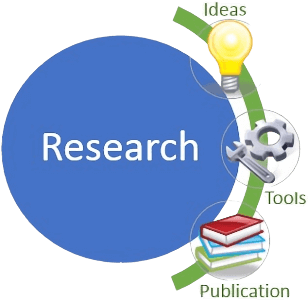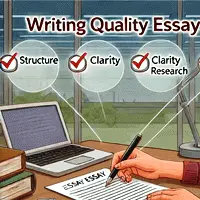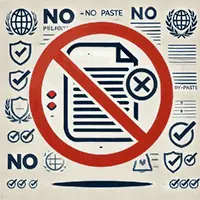 Research papers stand as pillars of knowledge dissemination and scholarly achievement. These meticulously created documents not only contribute to the advancement of human understanding but also play a pivotal role in shaping the academic trajectory of individuals. Whether you are a budding researcher striving to make your mark or a seasoned scholar aiming for publication in prestigious journals, the importance of a well-edited research paper cannot be overstated. This is where professional research assignments editing help come into play, offering invaluable assistance in refining your work to perfection. We provide expert help, with the intent to transform a good research assignment into a great one. With their wealth of experience, our seasoned editors possess a keen eye for detail, an intimate understanding of citation styles, and an unwavering commitment to upholding the highest standards of academic integrity. They are the unsung heroes who work behind the scenes, ensuring that your research paper not only meets the rigorous criteria set by academic institutions but also shines as a beacon of clarity and coherence. One of the fundamental aspects that cannot be ignored is the fact that we can help to edit a research assignment. Whether you are grappling with structural issues, grappling with convoluted language, or struggling to conform to a particular style guide, these services step in as your trusted allies. They meticulously scrutinize every sentence, paragraph, and citation, rectifying grammatical errors, improving sentence flow, and ensuring that your paper adheres to the prescribed format. Moreover, we go beyond mere proofreading, by offering constructive feedback and suggestions to enhance the quality of your research paper. This collaborative approach encourages academic growth and empowers you to become a more effective communicator of your research findings. In essence, we not only polish your work but also serve as a valuable learning resource that equips you with the skills necessary to excel in the competitive world of academia. We will ensure that your research paper not only meets the exacting standards of academic excellence but also resonates with your target audience.
Research papers stand as pillars of knowledge dissemination and scholarly achievement. These meticulously created documents not only contribute to the advancement of human understanding but also play a pivotal role in shaping the academic trajectory of individuals. Whether you are a budding researcher striving to make your mark or a seasoned scholar aiming for publication in prestigious journals, the importance of a well-edited research paper cannot be overstated. This is where professional research assignments editing help come into play, offering invaluable assistance in refining your work to perfection. We provide expert help, with the intent to transform a good research assignment into a great one. With their wealth of experience, our seasoned editors possess a keen eye for detail, an intimate understanding of citation styles, and an unwavering commitment to upholding the highest standards of academic integrity. They are the unsung heroes who work behind the scenes, ensuring that your research paper not only meets the rigorous criteria set by academic institutions but also shines as a beacon of clarity and coherence. One of the fundamental aspects that cannot be ignored is the fact that we can help to edit a research assignment. Whether you are grappling with structural issues, grappling with convoluted language, or struggling to conform to a particular style guide, these services step in as your trusted allies. They meticulously scrutinize every sentence, paragraph, and citation, rectifying grammatical errors, improving sentence flow, and ensuring that your paper adheres to the prescribed format. Moreover, we go beyond mere proofreading, by offering constructive feedback and suggestions to enhance the quality of your research paper. This collaborative approach encourages academic growth and empowers you to become a more effective communicator of your research findings. In essence, we not only polish your work but also serve as a valuable learning resource that equips you with the skills necessary to excel in the competitive world of academia. We will ensure that your research paper not only meets the exacting standards of academic excellence but also resonates with your target audience.
Why must students edit their research projects?
Students must edit their research projects, as editing ensures the clarity and coherence of the research work. During the initial stages of research, students often focus on gathering and organizing information, which can lead to fragmented or disorganized writing. Editing helps to refine the structure, ensuring that ideas flow logically and the content is easy to follow for the reader. Additionally, editing is crucial for improving the quality of the research. It allows students to review their arguments, evidence, and analysis critically. Through careful editing, students can identify inconsistencies, errors, or gaps in their research and address them effectively. This process enhances the overall credibility and academic rigor of the project. Furthermore, editing helps students refine their writing style and language. It allows them to eliminate grammatical and punctuation errors, improve sentence structure, and choose precise and appropriate vocabulary. A well-edited research project demonstrates a student's commitment to academic excellence and professionalism. More so, editing is essential for adherence to academic standards and guidelines. It ensures proper citation and referencing, which is vital to avoiding plagiarism and maintaining academic integrity. Overall, editing is a vital step in the research process that contributes to the clarity, quality, and credibility of a student's work.
How does our expert editing guidance impact the quality of an academic assignment?
Our research paper editing services can have a profound impact on the quality of an academic assignment. We play a crucial role in refining and enhancing the overall quality of the work, as our expert editors possess a deep understanding of the subject matter and the academic conventions specific to various disciplines. They can identify inaccuracies, inconsistencies, or gaps in your argumentation, ensuring that your assignment is well-researched and logically sound. This helps you present a more compelling and academically rigorous piece of work. More so, our editors pay meticulous attention to language and writing style. They can improve the clarity, coherence, and conciseness of your writing, making it easier for readers to understand your ideas. This not only enhances the readability of your assignment but also demonstrates your proficiency in communication, which is a valuable skill in academia. Additionally, experts can help you adhere to the prescribed formatting and citation styles, such as APA, MLA, or Chicago. Correct formatting ensures that your assignment meets academic standards and avoids potential plagiarism issues. Furthermore, we provide you with valuable insights into your strengths and areas for improvement as a writer and researcher. This constructive feedback can foster your academic growth, helping you develop better research and writing skills over time. In essence, we can help elevate the quality of an academic assignment by refining its content, enhancing its readability, ensuring proper formatting, and offering valuable feedback for improvement. It ultimately contributes to the assignment's credibility, professionalism, and growth as a scholar.
What mistakes are corrected in research papers through editing?
Editing plays a crucial role in improving the quality and accuracy of research papers. Here are some common mistakes that are corrected through editing:
- Grammar and Syntax Errors: Editors correct grammatical errors, such as incorrect verb tense, subject-verb agreement, and sentence structure. Proper syntax ensures clarity and readability.
- Wrong Spelling and Typos: Editors catch and rectify spelling mistakes and typographical errors that can undermine the paper's credibility.
- Poor Punctuation: Correct use of punctuation marks, such as commas, semicolons, and hyphens, is vital for conveying the intended meaning accurately.
- Lack of Clarity and Conciseness: Editors help authors refine their writing to make it more concise and clearer. This includes eliminating unnecessary jargon and ensuring that complex ideas are presented understandably.
- Poor Consistency: Editors ensure consistency in formatting, citation style, and terminology throughout the paper. Inconsistent usage can confuse readers.
- Improper Structure and Organization: Editors assess the logical flow of the paper, making sure that the introduction, methodology, results, and conclusion are appropriately structured and interconnected.
- Misplaced Citations and References: Editors verify that all sources are properly cited and formatted according to the chosen citation style (e.g., APA, MLA, Chicago).
- Plagiarism: Editors may use plagiarism detection tools to identify and address any instances of unoriginal content.
- Wrong Style and Tone: Editors help authors maintain a consistent writing style and tone, ensuring that the paper aligns with the conventions of academic or scientific writing.
 We play a crucial role in ensuring the quality and effectiveness of academic and scientific research. Our professional guidance in the form of expert editors and proofreaders can significantly enhance the overall impact of a research paper, making it more polished, coherent, and error-free. This, in turn, increases the chances of acceptance by journals, improves the readability and comprehension of the paper for readers, and ultimately contributes to the advancement of knowledge in various fields. One of the key takeaways from this discussion is the importance of objectivity and a fresh perspective in the editing process. While researchers invest significant time and effort into their work, they may become too close to their writing to identify errors, inconsistencies, or areas where clarity can be improved. We bring a critical eye and a wealth of experience to the table, helping researchers refine their ideas and arguments while adhering to the specific requirements of their chosen publication. Furthermore, our academic assignments editing guidance can also assist non-native English speakers in achieving a higher level of language proficiency in their papers, ensuring that language barriers do not hinder the dissemination of valuable research findings. In today's highly competitive academic and scientific landscape, where the quality of research papers can significantly impact one's career and reputation, seeking the assistance of professional editors is a wise investment. It not only ensures that research is presented in the best possible light but also contributes to the integrity and credibility of the academic and scientific community as a whole. As such, researchers should consider integrating professional editing services into their publishing process to maximize the impact and reach of their work.
We play a crucial role in ensuring the quality and effectiveness of academic and scientific research. Our professional guidance in the form of expert editors and proofreaders can significantly enhance the overall impact of a research paper, making it more polished, coherent, and error-free. This, in turn, increases the chances of acceptance by journals, improves the readability and comprehension of the paper for readers, and ultimately contributes to the advancement of knowledge in various fields. One of the key takeaways from this discussion is the importance of objectivity and a fresh perspective in the editing process. While researchers invest significant time and effort into their work, they may become too close to their writing to identify errors, inconsistencies, or areas where clarity can be improved. We bring a critical eye and a wealth of experience to the table, helping researchers refine their ideas and arguments while adhering to the specific requirements of their chosen publication. Furthermore, our academic assignments editing guidance can also assist non-native English speakers in achieving a higher level of language proficiency in their papers, ensuring that language barriers do not hinder the dissemination of valuable research findings. In today's highly competitive academic and scientific landscape, where the quality of research papers can significantly impact one's career and reputation, seeking the assistance of professional editors is a wise investment. It not only ensures that research is presented in the best possible light but also contributes to the integrity and credibility of the academic and scientific community as a whole. As such, researchers should consider integrating professional editing services into their publishing process to maximize the impact and reach of their work.
Best Way to Edit an Academic Paper | Best Manuscript Editing
 Editing an academic paper is a crucial step in the journey toward producing a well-crafted and impactful scholarly work. Whether you are a student striving for academic excellence, a researcher aiming to publish in prestigious journals, or an author seeking to convey your ideas effectively, the process of refining your manuscript is essential. It is in this precise arena that we step in, offering you the best academic assignment editing guidance. Academic assignments, be they essays, research papers, theses, or dissertations, demand meticulous attention to detail. They require adherence to specific formatting styles, clarity in conveying complex ideas, and impeccable language usage. As the saying goes, "The devil is in the details," and when it comes to academic writing, this couldn't be more accurate. A single typographical error or an unclear sentence can detract from the credibility and impact of your work. We understand that the editing process can be discouraging, especially for those new to academic writing or those striving for perfection in their work. We don't just offer editing services; we are your dedicated guides throughout the journey of refining your academic assignment. Our team of experienced editors comprises experts from various academic fields, ensuring that your paper receives specialized attention, regardless of your subject area. We can guide you on how to edit a research assignment by providing comprehensive feedback and suggestions to enhance your manuscript's structure, coherence, and overall quality. We focus on improving grammar, punctuation, and syntax, eliminating redundancies, and suggesting better word choices to elevate the clarity and readability of your work. Moreover, we pay meticulous attention to citation and referencing styles, ensuring that your paper adheres to the specific guidelines required by your institution or target publication. In addition to correcting errors and enhancing the technical aspects of your paper, we also offer insights into strengthening the overall argument and presentation of your ideas. Our goal is not only to polish your manuscript but also to help you become a more effective academic writer. We believe that every academic assignment is an opportunity for growth, and our editing services are designed to facilitate your academic journey. With our guidance and expertise, you can confidently navigate the intricacies of editing an academic paper and present a manuscript that stands out in the scholarly arena. Your success is our priority, and we are committed to helping you unlock the full potential of your academic writing.
Editing an academic paper is a crucial step in the journey toward producing a well-crafted and impactful scholarly work. Whether you are a student striving for academic excellence, a researcher aiming to publish in prestigious journals, or an author seeking to convey your ideas effectively, the process of refining your manuscript is essential. It is in this precise arena that we step in, offering you the best academic assignment editing guidance. Academic assignments, be they essays, research papers, theses, or dissertations, demand meticulous attention to detail. They require adherence to specific formatting styles, clarity in conveying complex ideas, and impeccable language usage. As the saying goes, "The devil is in the details," and when it comes to academic writing, this couldn't be more accurate. A single typographical error or an unclear sentence can detract from the credibility and impact of your work. We understand that the editing process can be discouraging, especially for those new to academic writing or those striving for perfection in their work. We don't just offer editing services; we are your dedicated guides throughout the journey of refining your academic assignment. Our team of experienced editors comprises experts from various academic fields, ensuring that your paper receives specialized attention, regardless of your subject area. We can guide you on how to edit a research assignment by providing comprehensive feedback and suggestions to enhance your manuscript's structure, coherence, and overall quality. We focus on improving grammar, punctuation, and syntax, eliminating redundancies, and suggesting better word choices to elevate the clarity and readability of your work. Moreover, we pay meticulous attention to citation and referencing styles, ensuring that your paper adheres to the specific guidelines required by your institution or target publication. In addition to correcting errors and enhancing the technical aspects of your paper, we also offer insights into strengthening the overall argument and presentation of your ideas. Our goal is not only to polish your manuscript but also to help you become a more effective academic writer. We believe that every academic assignment is an opportunity for growth, and our editing services are designed to facilitate your academic journey. With our guidance and expertise, you can confidently navigate the intricacies of editing an academic paper and present a manuscript that stands out in the scholarly arena. Your success is our priority, and we are committed to helping you unlock the full potential of your academic writing.
The impact of a well-edited research project on your academic excellence
A well-edited research project can have a significant impact on one's academic excellence. Effective editing enhances the clarity, coherence, and overall quality of the work, leading to undeniable benefits. These benefits include;
- Improved Clarity: Editing helps in refining the language and structure of the research project. This ensures that the ideas and arguments are presented visibly and concisely, making it easier for readers and assessors to understand the research.
- Enhanced Credibility: A well-edited research project demonstrates a high level of professionalism and attention to detail. It reflects positively on the researcher's commitment to academic rigor and can enhance the credibility of the work and the researcher.
- Higher Grades: Academic assessors often place a premium on well-organized and well-written research. A polished project is more likely to receive higher grades as it effectively communicates the research findings and insights.
- Improved Communication: Effective editing ensures that the research project communicates its message effectively. This is crucial in academia, where the dissemination of knowledge and ideas is paramount.
- Better Reception: A well-edited research project is more likely to be well-received by peers, instructors, and the academic community as a whole. It can lead to opportunities for collaboration, networking, and recognition.
- Skill Development: Engaging in the editing process helps researchers develop critical writing and analytical skills. These skills are transferable and can benefit students in various aspects of their academic journey.
What are the most effective ways to review a research paper?
Reviewing a research paper effectively is crucial for ensuring the quality and validity of scientific work. This is the best way to edit an academic paper:
- Read Carefully: Start by reading the paper thoroughly. Pay attention to the abstract, introduction, methodology, results, discussion, and conclusion sections. Understand the research question, objectives, and the author's hypothesis.
- Evaluate the Methodology: Assess the research methods and experimental design. Are they appropriate for addressing the research question? Look for any flaws or biases in the methodology that might affect the results.
- Check Data and Results: Examine the data presented in tables, figures, and charts. Ensure that the results are accurately represented and that statistical analyses are appropriate. Check for any inconsistencies or anomalies.
- Assess the Literature: Evaluate the paper's citation of existing literature. Are relevant studies cited, and is there a comprehensive review of prior work? Ensure that the paper contributes something new to the field.
- Consider the Interpretation: Evaluate the author's interpretation of the results in the discussion section. Are the conclusions supported by the data? Look for any overgeneralizations or unwarranted claims.
- Check Clarity and Structure: Assess the clarity of writing and the organization of the paper. Ensure that the paper flows logically and that concepts are explained clearly. Look for grammar and formatting errors.
- Maintain Objectivity: Review the paper objectively, without bias or personal prejudice. Focus on the scientific merit of the work rather than the author's identity or affiliation.
- Follow Review Guidelines: If you are conducting a peer review for a journal or conference, follow the specific guidelines provided by the publication. Provide a clear and well-structured review report.
 Editing an academic paper is a crucial step in the research and publication process, and it requires careful attention to detail and a systematic approach. While there isn't a one-size-fits-all method for editing, a reliable research project editing approach involves a combination of self-editing and seeking external feedback. Starting with self-editing, it's essential to take a break from your work to gain a fresh perspective. Review your paper for clarity, coherence, and organization. Pay attention to grammar, spelling, and punctuation errors. Ensure that your arguments are well-structured and supported by evidence. Additionally, check your citations and references to ensure they follow the required style guide, such as APA, MLA, or Chicago. After self-editing, seeking the help of our professional editors is invaluable. We can offer a different perspective and identify issues that you may have overlooked. Constructive criticism can help you refine your arguments, improve your writing style, and eliminate any lingering errors. Furthermore, utilizing technology can also aid in the editing process. Spell checkers, grammar tools, and plagiarism detectors can assist in catching common mistakes and ensuring the integrity of your work. Ultimately, the best editing process is iterative. It involves multiple rounds of editing and refining your paper until it meets the highest academic standards. It's essential to approach editing with a critical mindset and a commitment to improving the quality of your work. In the world of academia, the quality of your research is judged not only by the depth of your knowledge but also by the clarity and precision of your writing. Remember that editing is not just a chore to be completed, it is a crucial step toward achieving academic excellence.
Editing an academic paper is a crucial step in the research and publication process, and it requires careful attention to detail and a systematic approach. While there isn't a one-size-fits-all method for editing, a reliable research project editing approach involves a combination of self-editing and seeking external feedback. Starting with self-editing, it's essential to take a break from your work to gain a fresh perspective. Review your paper for clarity, coherence, and organization. Pay attention to grammar, spelling, and punctuation errors. Ensure that your arguments are well-structured and supported by evidence. Additionally, check your citations and references to ensure they follow the required style guide, such as APA, MLA, or Chicago. After self-editing, seeking the help of our professional editors is invaluable. We can offer a different perspective and identify issues that you may have overlooked. Constructive criticism can help you refine your arguments, improve your writing style, and eliminate any lingering errors. Furthermore, utilizing technology can also aid in the editing process. Spell checkers, grammar tools, and plagiarism detectors can assist in catching common mistakes and ensuring the integrity of your work. Ultimately, the best editing process is iterative. It involves multiple rounds of editing and refining your paper until it meets the highest academic standards. It's essential to approach editing with a critical mindset and a commitment to improving the quality of your work. In the world of academia, the quality of your research is judged not only by the depth of your knowledge but also by the clarity and precision of your writing. Remember that editing is not just a chore to be completed, it is a crucial step toward achieving academic excellence.










